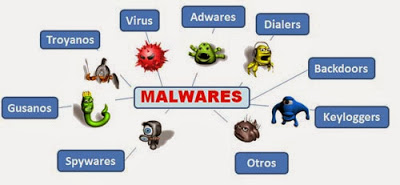Distinguish malware, viruses and Trojan horses
Most of us don't really know the difference between malware, viruses and Trojan horses. All three types are dangerous programs that can harm computers. There are many differences between these 3 types and if you know this difference you can better protect your computer from serious consequences.
What is Malware?

According to Science ABC, malware is a type of software (a piece of code) written to infect or harm the system it enters (for example, the server system). It is simply a generic term used to refer to a variety of software types that infiltrate or destroy, which adversely affect your system performance.
Malware can have many purposes. It can be used to spy on or steal information from your system, compromise your computer, or to extort money. Malware will become more dangerous when it is regularly hidden in normal harmless files.

Malware can include viruses, adware, nagware, spyware, worms, trojan horses, and many other types of malware. This means viruses and trojan horses are two types of malware. So if you want to distinguish malware and viruses, it's like you distinguish between "weapons" and "guns".
What is a virus?

A computer virus is a program or code that is loaded into your computer without your knowledge and it has the opposite effect to what you want. Some viruses not only cause small effects, but they can also endanger hard drives, software, or files. Most viruses are attached to a program file, which means that the virus may already exist on your computer but it cannot be dangerous unless you run or open the program.
A virus cannot spread itself without human impact (eg running virus-bearing programs). People will continue to spread viruses when sharing or mailing infected files.
What is Trojan Horse?

First, we will recall a famous monument in Greek mythology. After 10 years of fighting in the Trojan City, the Greeks were unable to defeat the Trojans with military strength, and were forced to follow the Odyssey's plan of unloading and taking wood to make a horse - meaning like a gift from the Greek army to compensate for the destroyed Athena statue. In fact the horse is full of soldiers. When the Trojans were drunk after the victory party, the Greeks in the horse's abdomen broke out and opened the gate for the outside troops to enter. Thanks to the wooden horse, the Greek army won and completely defeated the enemy. (By Wikimedia)
In the computer world, the concept of Trojan Horse was born since CDC (Cult of the Dead Cow) created Back Orifice, the most famous trojan ever. They were so named because the malware had a lot of similarities with the wooden horse that was put into the Trojan.
Trojan horse is a kind of malicious malicious computer program. If someone tells you that your computer has been infected with Trojan horse, then you will know that it is in serious trouble (unless your computer has an excellent antivirus software preinstalled).
Trojan horses have the ability to hide themselves into normal, harmless software. Unfortunately, this makes it easier for them to bring negative effects to your computer. For example, when you see a computer cleaning software that is quite interesting. This software is committed to maximizing the performance of computer systems. You find that your computer is also in need of cleaning up. So, you've downloaded the software and installed them yourself.
Boom! Unconsciously, you have successfully installed a Trojan horse on your computer!
The effects of Trojan horses are diverse. Some will "help" you change the screen image or throw your icons around, messy around the screen. Others cause more serious harm to your computer (spy, steal or sell your information to third parties). And because Trojan horses need to have human installation to harm computers, so the best thing you can do is not install any software unless it's a part. Soft origin reliable and legal.
Whether virus or trojan horse, they are all malicious software; and more or less, they all have a direct impact on performance and "life time" of your computer. And because your computer needs a lot of different software to serve your different purposes, you should have a powerful antivirus program that can protect your system from software. malicious, including viruses and Trojan horses.